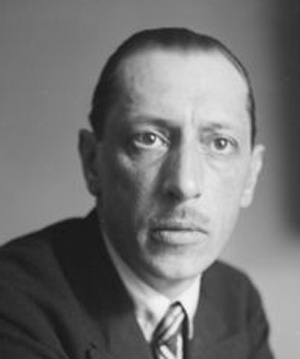DEBUSSY, STRAVINSKY, & SCRIABIN
Notes on the composers and the pieces
Claude Debussy (arr. Alain Altinoglu)
Concert Suite from Pelléas et Mélisande
Igor Stravinsky
Chant funèbre (Funeral Song)
Alexander Scriabin
Le poème de l’extase (Poem of Ecstasy)
Return to Home Page |

Igor Stravinsky
Some of Igor Stravinsky’s (1882–1971) first works bear the stamp of his teacher, Nikolai Rimsky-Korsakov, especially Symphony in E Flat (1907) and Fireworks (1908). Others were influenced by Claude Debussy, particularly Scherzo Fantastique (1907–8). It was Fireworks that caught the attention of Sergei Diaghilev, who commissioned Stravinsky’s Firebird (1910) for his Ballets Russes in Paris. Firebird’s vivid colors and exotic harmonies made Stravinsky a sensation, laying the foundation for further collaborations with Diaghilev, including Petrushka (1911) and The Rite of Spring (1912).
As it turned out, there was a transitional work between Fireworks and Firebird called Chant funèbre. Stravinsky wrote it for a 1909 memorial concert dedicated to Rimsky-Korsakov, who had died the previous year. Unfortunately, the score and parts disappeared after that concert, and the work seemed lost. Years of searching for it by Viktor Varunts and Natalya Braginskaya of the St Petersburg Conservatory proved fruitless until 2015 when an old Conservatory building was being refurbished, and fixtures, materials, and music were temporarily moved elsewhere. During the transfer, library official, Irina Sidorenko, discovered an orchestral flute part that read: “I. Stravinsky—Pogrebalnaya pesnya—Flauto 1.” According to Stravinsky biographer, Stephen Walsh, it bore the official stamp of the Russian Symphony Concerts that included the Chant performance. Various catalogue numbers had been crossed out, and it looked as if the parts had been preserved almost by accident, since it was normal…for manuscripts withdrawn from the catalogue to be destroyed…Sidorenko picked up the phone. “That work you were looking for, was it Pogrebalnaya pesnya? By Stravinsky?… I have this music in my hand”…all fifty-eight orchestral parts, in a neat copyist’s hand.
The score was reconstructed from the parts, and a performance followed in December 2016 at St. Petersburg’s Mariinsky Theater under Valery Gergiev.
Stravinsky considered Chant Funebre “the best of my works before The Firebird, and the most advanced in chromatic harmony…” Rimsky-Korsakov and Debussy influences are obvious, but Chant also sounds like the work of the composer of Firebird. Like Firebird, it begins quietly from deep in the orchestra until flutes and violins let in sunlight. Soon, “all the solo instruments of the orchestra file past the tomb of the master in succession, each laying down its own melody as its wreath” (Stravinsky). That takes the form of a dirge motto beginning in a muted horn and then traveling about the orchestra, often surrounded by somber flourishes. After a menacing cello figure, the other strings respond nervously, and the dirge returns, somber and sad. Soft brass, basses and bass clarinet have their say, and luminescent minor chords supply a fitting end.
—Roger Hecht
Roger Hecht plays trombone in the Mercury Orchestra and Bay Colony Brass (where he is the Operations/Personnel Manager). He is a former member of the Syracuse Symphony, Lake George Opera, New Bedford Symphony, and Cape Ann Symphony, as well as trombonist and orchestra manager of Lowell House Opera, Commonwealth Opera, and MetroWest Opera. He is a regular reviewer forAmerican Record Guide, contributed to Classical Music: Listener’s Companion, and has written articles on music for the Elgar Society Journal and Positive Feedback Magazine. His fiction collection, The Audition and Other Stories, includes a novella about a trombonist preparing for and taking a major orchestra audition (English Hill Press, 2013).
Return to Home Page
> BUY TICKETS |
